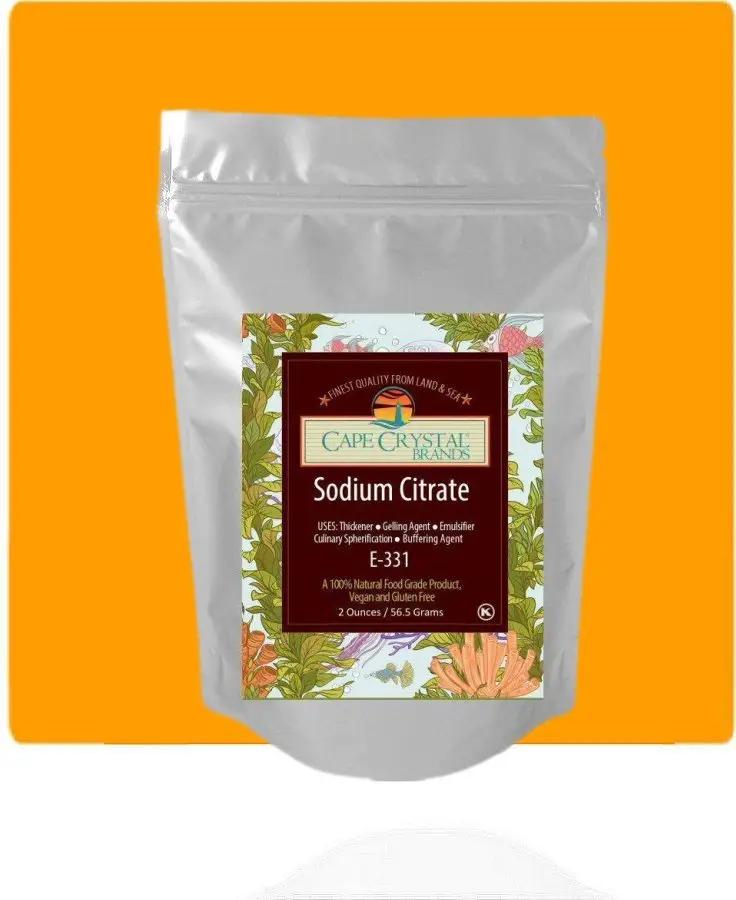
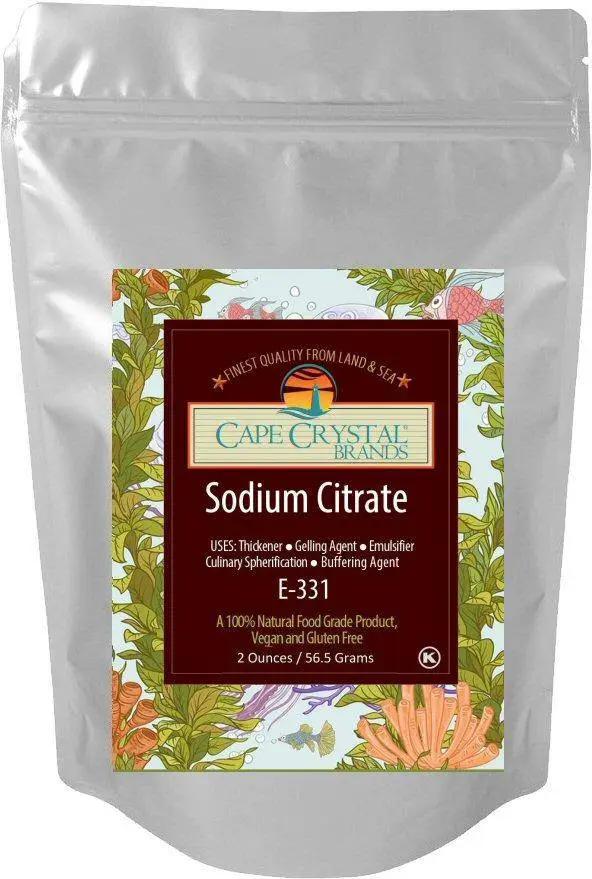
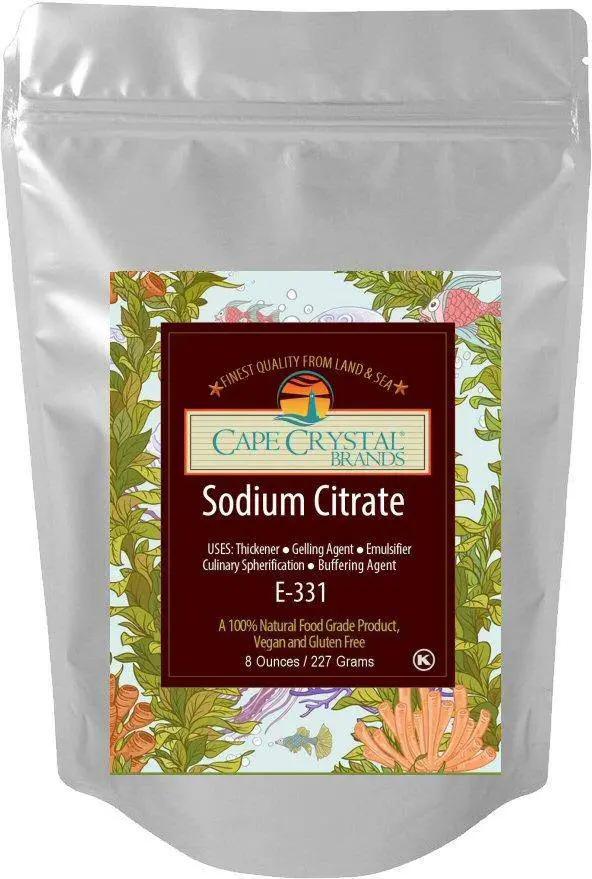
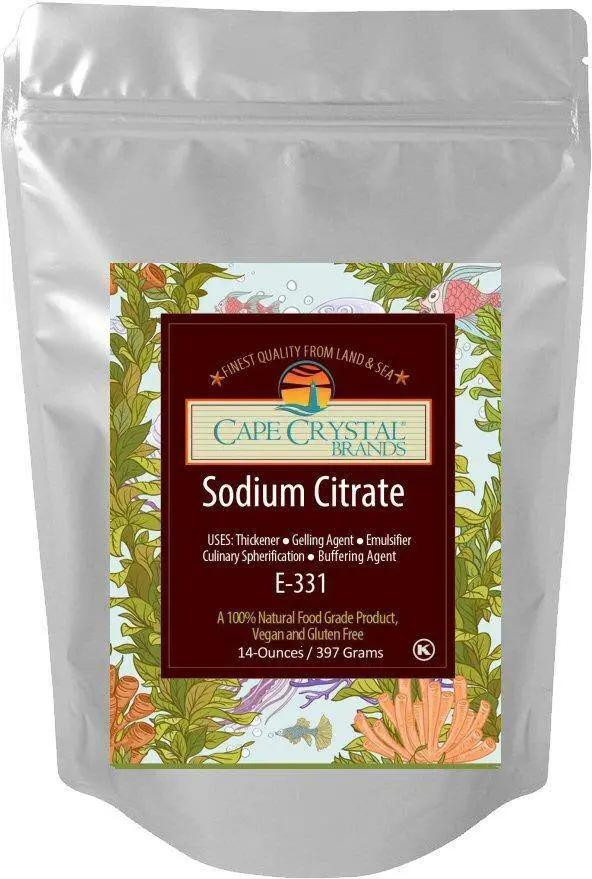
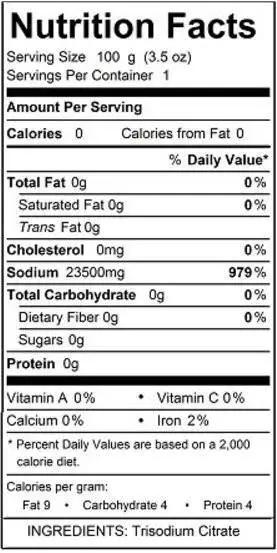
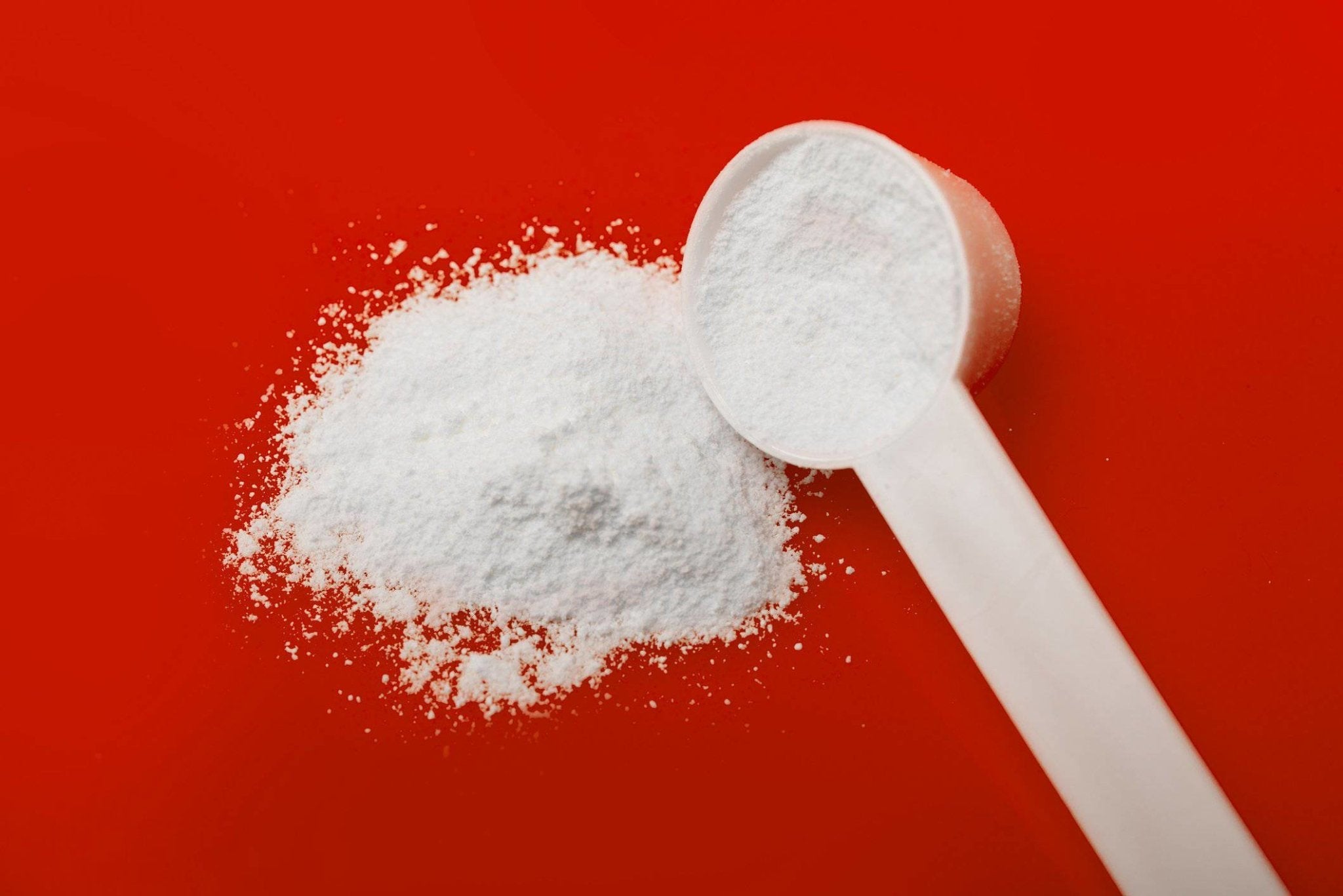






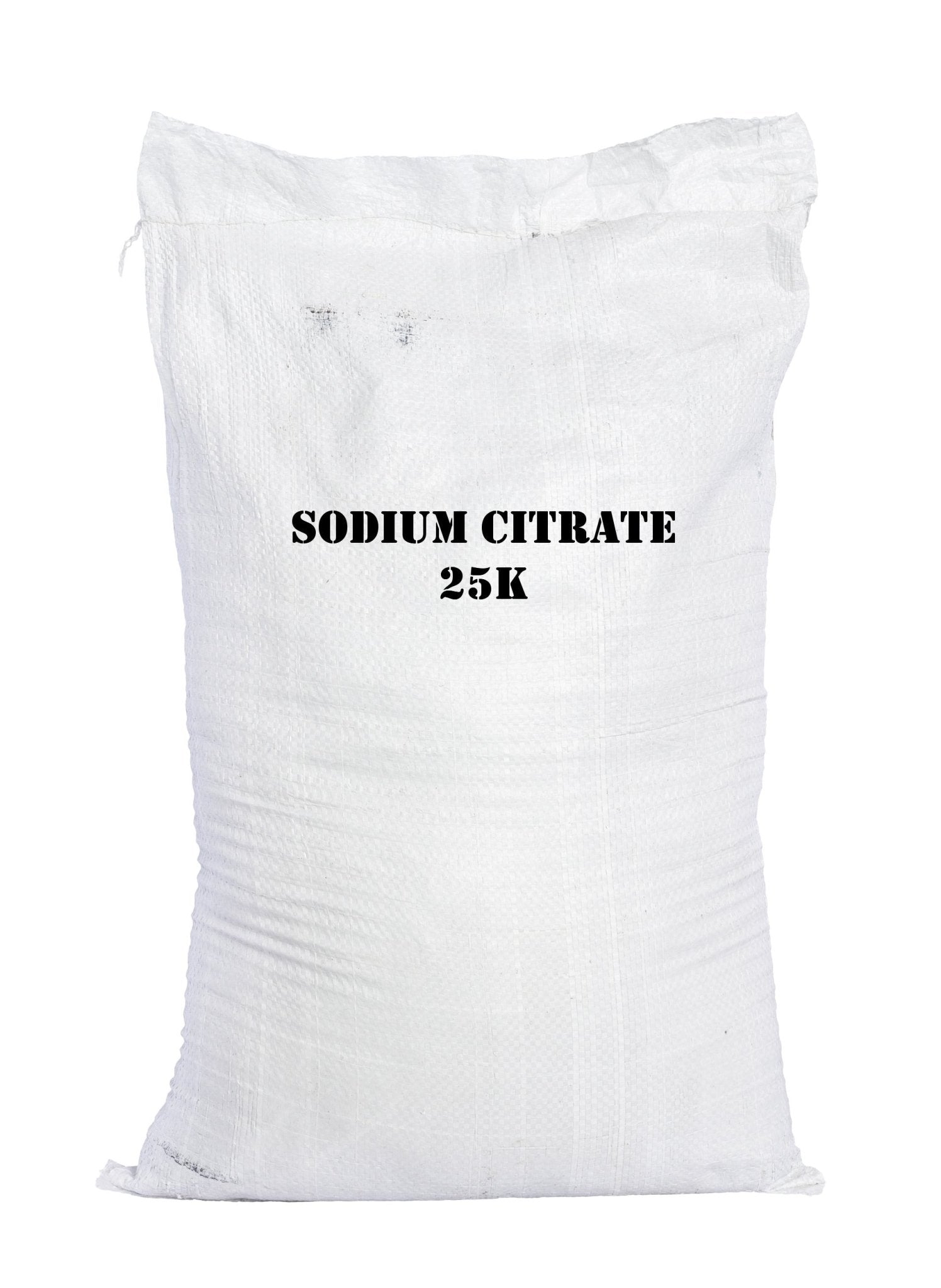













Sodium Citrate – Premium Food-Grade Emulsifier & pH Regulator
- Sale price
- $5.95
- Regular price
- $5.99
- You save
- $0.04 (1%)
Size: 2-oz
Frequently Bought Together
We Accept
PROPERTIES
Gluten-Free, Plant-Based, Kosher (K)
Pure Sodium Citrate Powder
None
Product Information
What is Sodium Citrate?
Sodium Citrate, also known as trisodium citrate, is a versatile food additive used as a pH regulator, emulsifier, and preservative. It is widely used in cheese-making, molecular gastronomy, beverages, and food processing to control acidity, improve texture, and enhance flavor. With its excellent buffering properties, Sodium Citrate is essential for smooth, creamy sauces, dairy stabilization, and effervescent drinks.
Uses & Applications:
🔹 Cheese-Making & Dairy – Prevents separation and creates smooth, melty cheese sauces and processed cheeses.
🔹 Molecular Gastronomy – Used in spherification to adjust acidity and enhance gel formation.
🔹 Beverages & Soft Drinks – Acts as an acid regulator and flavor enhancer in sodas and electrolyte drinks.
🔹 Sauces & Emulsions – Improves stability and consistency in creamy sauces, gravies, and soups.
🔹 Meat Processing & Curing – Helps retain moisture and maintain juiciness in cured meats.
🔹 Pharmaceutical & Medical Use – Used in antacids, buffering solutions, and rehydration formulas.
Why Choose Our Sodium Citrate?
✔ 100% Food-Grade & Safe – High-purity trisodium citrate for food and beverage applications.
✔ Non-GMO, Gluten-Free, and Vegan-Friendly – Suitable for all dietary needs.
✔ Superior Emulsification & pH Control – Ensures smooth textures and balanced acidity.
✔ Prevents Ingredient Separation – Essential for melted cheese, sauces, and emulsified products.
✔ Highly Soluble & Neutral Taste – Dissolves quickly for easy incorporation into recipes.
How to Use Sodium Citrate:
- Melty Cheese Sauces & Processed Cheese: Use 2-4g per 100g of cheese to create smooth textures.
- Molecular Gastronomy (Spherification): Add 0.5-1g per 100g of liquid to adjust acidity.
- Beverages & Electrolyte Drinks: Use 0.2-1% by weight to regulate pH and enhance flavor.
- Sauces & Dressings: Add 0.1-0.5% for improved emulsification and stability.
- Meat Processing & Curing: Use 0.5-1% to retain moisture and improve texture.
Product Specifications:
- Ingredients: 100% Pure Sodium Citrate (Trisodium Citrate)
- Appearance: Fine white crystalline powder
- Shelf Life: 2+ years if stored in a cool, dry place
- Packaging: Available in 100g, 500g, and 1kg resealable bags
Order Your Sodium Citrate Today!
Upgrade your recipes with high-quality Sodium Citrate, the perfect pH regulator, emulsifier, and texture enhancer for cheese-making, molecular gastronomy, and beverage formulation!
The Exciting Uses of Sodium Citrate in Recipes Just For You
Among the myriad components that enrich the marvel of culinary arts, sodium citrate holds a special place. It's because this amazing ingredient, also dubbed as trisodium citrate, has a knack for introducing an enigmatic flavor to your food that's both exquisite and tantalizing to your palates. It's the secret behind the velvety mac 'n' cheese that you simply can't get enough of or that faultless hollandaise sauce drizzled over your eggs benedict that's incredibly creamy and inviting.
A derivative of citric acid, it's the magic element that's silently working wonders in your food. While citric acid is known for its tangy effect, combining with sodium in sodium citrate adds that necessary equilibrium of savoriness that elevates the overall flavor profile. But the role of sodium citrate doesn't end in enhancing taste - it has an important technical part to play too. It acts as an emulsifier, meaning it brings together fats and water, which typically don't mix. This adds to the smooth, harmonious texture of your food. So, whether you're baking a cake or cooking up a cheese sauce, sodium citrate can prevent it from going grainy or curdling, ensuring that the result is nothing short of perfection.
But the uses of sodium citrate aren't confined to just professional kitchens. While it's more common in commercial food production, its uses in a home kitchen context, offer an exciting view to new possibilities in cooking. You can add a pinch of it to your homemade cheeses to prevent them from melting into an oily mess or to your homemade sodas to regulate acidity. Throwing a dinner party? Your velouté and bechamel sauces aren't going to separate midway. Brewing some beer at home? Add sodium citrate to stabilize the brew and reduce the chances of sedimentation.
So, the next time you cross paths with sodium citrate in a food label, remember - it's the secret ingredient that's working to ensure not just a wonderful eating experience, but also a consistency in quality that's hard to achieve with just conventional ingredients. Brought to you by Cape Crystal Brands, we're committed to bringing you reliable, quality ingredients and innovative solutions for your everyday needs. Get your hands on some sodium citrate and unleash a new world of culinary adventure at home.
The Role of Sodium Citrate and Citrate in Blood Platelet Aggregation
The role of sodium citrate and citrate in blood platelet aggregation is pivotal to our health care. A popular food ingredient found in many recipes, sodium citrate's ability to interact with blood can't be overlooked. This unique property has made it an essential asset in the medical field, specifically as a citrate anticoagulant. A citrate anticoagulant works by disrupting the blood clotting process, hence reducing the chances of clot formation, and ultimately promoting health.
The science behind this mechanism is simple. When added to blood, sodium citrate binds to the calcium ions present. Calcium ions play a significant role in the clotting process; thus sodium citrate's interference prevents the blood from forming clots. This characteristic is incredibly beneficial in numerous health care settings. For instance, during blood transfusions, dialysis, or in the preparation of samples for microscopy or other testing, the use of sodium citrate is crucial to maintain the blood in a fluid state.
Naturally, the question arises if this mechanism interferes with calcium absorption or has any adverse effects on our health. Rest assured, these effects are limited to the site of action and do not impact the overall calcium absorption in the body, reinforcing the safety of sodium citrate usage in our care. However, sodium citrate should not be used by individuals with hypernatremia or hypercalcemia, as it could exacerbate these conditions. As always, care and consideration are paramount in the administration of any form of health treatment.
Despite its crucial part in medical care, sodium citrate's role is not restricted to the medical field. It is also valued in the culinary world for its ability to balance or enhance flavors while its discovered anticoagulant properties only add up to its versatile usage. It's a typical example where science and gastronomy intersect, adding to the versatility and desirability of sodium citrate.
In conclusion, the role of sodium citrate and citrate in blood platelet aggregation is an indispensable aspect in today's health care. At Cape Crystal Brands, we are fully aware of the benefits of sodium citrate, not just as a food ingredient, but also as a tool to improve the quality of life. Our emphasis on using quality components advocates for the hospitality industry's commitment to exceptional care.
Unpacking the Science: The Side Effects and Precautions of Sodium Citrate
As a seasoned stalwart of the culinary world, I've seen firsthand the wonders that sodium citrate can work in the kitchen. Yet, while its role in stabilizing and emulsifying dairy products is well lauded, there's another facet to sodium citrate that goes often overlooked – the science behind it, particularly pertaining to side effects and precautions one must care to consider before using it.
Sodium citrate, like any food ingredient, isn't without its own set of effects, side and otherwise. While it's generally recognized as safe by care professionals and regulatory authorities, certain individuals may react adversely due to underlying health conditions. Rapid intravenous infusion of the sodium citrate solution can, in rare cases, result in metabolic alkalosis, a condition characterized by increased bicarbonate concentrations in the body.
In patients with impaired kidney function, an acute intake of sodium citrate may lead to a buildup of citrate in the blood, thereby creating a risk of citrate toxicity. Hence, taking precautionary measures like adjusting the sodium citrate intake or opting for alternatives may be necessary under the guidance of health care professionals.
As for the measurement, the recommended quantity of sodium citrate in the diet is not measured in ml as one might mistakenly assume, but in milligrams. An adult with normal health can typically consume about 500-1000 mg of sodium citrate a day without facing any negative effects, though this could vary based on individual health conditions and dietary habits.
That said, it's essential to understand that sodium citrate works differently for different individuals. While one person might experience no negative side effects even after taking substantial quantities, another might be more sensitive. Hence, being mindful of this and taking proper precautionary measures when using sodium citrate solution in recipes is crucial.
Despite the need for caution, sodium citrate continues to be an indispensable ingredient in many culinary creations. Its ability to transform textures and intensify flavors, while adding a bit of scientific intrigue, is what makes it universally valued and used by chefs from Cape Crystal Brands and beyond. But remember, a discerning diner is a well-educated one. Knowing about the sodium citrate side effects is just as important as knowing how it can enhance your recipes. It's all about finding balance, isn't it?
Add Sodium Citrate to Your Wishlist: A contributor to Molecular Gastronomy and Spherification
Sodium citrate has been creating waves in the culinary world, emerging as a star contributor to molecular gastronomy and spherification, beckoning every gastronome to add this wonder ingredient to their wish list. It's a chapter of a food science book that offers new and inventive ways to present and consume your favorite dishes. As part of Cape Crystal Brands services, we encourage all chefs and food enthusiasts to explore the scientific and flavorful possibilities that sodium citrate presents.
Ever wondered how science direct plays a part in the food we consume? Sodium citrate is a perfect representation of this intertwining of science and food. It works as an emulsifier, allowing us to mix ingredients that normally wouldn't combine smoothly, such as cheese and water for a silky cheese sauce. Due to its ability to regulate acidity levels, certain amounts are applicable to different recipes, enhancing the flavor while maintaining the dish's structural integrity.
The culinary benefits aside, one may wonder about the safety and health implications when sodium citrate is taken orally. When consumed in moderate amounts, this ingredient is generally deemed safe. The common dosage is usually sodium citrate 500 mg orally three times per day. However, it is highly advisable to consult with a dietitian or healthcare service provider before taking any dietary supplements, especially if the individual is under certain medical conditions. The keyword here is moderation.
Sodium citrate also plays a pivotal role in the medical world. Apart from the culinary applications, this substance is also significant in preventing blood platelet aggregation. By keeping the blood from clotting in the blood vessels, it aids in maintaining a smooth and healthy blood flow, contributing to the overall well-being of an individual.
In conclusion, sodium citrate surely deserves a place in your kitchen pantry. Not only does it add a touch of 'Science Direct' to your food, but it also caters to your health needs. The side effects are minimal, provided the individual utilizes the proper precautions in taking this additive. As Cape Crystal Brands continues to bring you the best of both worlds, we look forward to being part of your culinary journey with sodium citrate.
Conclusion
In conclusion, Sodium Citrate plays a dual role - enhancing gastronomical experiences and improving the scientific stability of cuisines. This ingredient, by Cape Crystal Brands, complements the chef's creativity while ensuring dishes' consistency and appeal. Its nuanced understanding helps in marrying science with flavors, creating memorable culinary experiences. Perfect your craft, support it with science, and pay heed to the transformative power of Sodium Citrate. Stay tuned to explore more such fascinating food ingredients with Cape Crystal Brands, your trusted partner in the culinary journey.
This product is certified Kosher (Pareve) by the Orthodox Union.
Available in 2-OZ, 8-OZ and 14-OZ packages.
Recommended for You
Browsing history
- Choosing a selection results in a full page refresh.
POLICY PAGES
QUICK LINKS
CONTACT INFORMATION
Cape Crystal Brands, 18 Bank St., Suite 1, Summit NJ 07901.
- Phone: +1 908-273-5600
- Email: info@capecrystalbrands.com
- Tax ID: 26-2477626000
- FDA Facility Registration # 16980627550
- Kosher Certified: OKosher.org
Country/region
© 2025, Cape Crystal Brands | Sitemap
